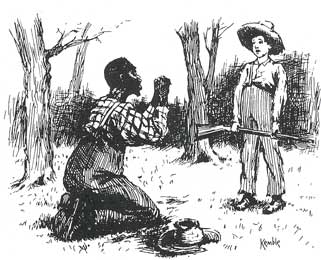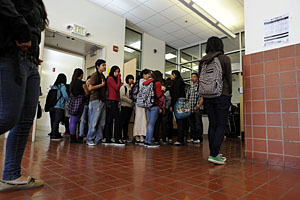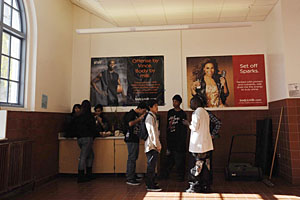
Photo: Mark Murrmann
Editors’ Note: This education dispatch is part of an ongoing series reported from Mission High School, where education writer Kristina Rizga is embedded for the year. Click here to see all of MoJo’s recent education coverage, or follow Kristina’s writing on Twitter or with this RSS Feed.
It’s 8:10am and I’m sitting in a Mission High School World History class waiting for 20 kids to trickle in. Theoretically, these are some of the more challenging kids to teach. One student near me is a “safety transfer” from another San Francisco school, where gangs invaded his world. A student I’ll call Benton walks in late with a serious, apprehensive look on his face. He towers above the other kids, and is considered loud and disruptive in other classes.
Twice I’ve watched teachers ask him to leave their classrooms. I wonder if this teacher will too.
World History teacher Jenn Bowman passes out an assignment while students talk about the recent shootings in Arizona. “Did you all hear about this?” she asks. “My father told me about it last night,” says the safety-transfer kid. “Why do they hate immigrants in Arizona?” a Latino student wonders aloud. Ms. Bowman asks a student to summarize the latest Arizona news for the rest of the class.
The class moves on to their assignment: Completing sentences that place “capitalism” and “communism” in historic context.
“Can I have a piece of paper?” asks a student with a copy of Alan Gratz’s “Samurai Shortstop” on his desk.
“What are tenements?” another student yells out. “Very cramped apartments,” someone stage-whispers in response.
Ms. Bowman asks students to raise their hands if they have questions and walks around the classroom with extra supplies, responding to students in a low voice. Students hunch over their papers for 10 minutes in silence.
Next, Ms. Bowman darkens the room for “China Blue,” a documentary that follows the life of 17-year-old Jasmine, a Sichuan province native who works 22 hours a day to produce jeans in exchange for a pitiful wage. This part of the film shows how some of these jeans are transported to America, across the Bay. “Oh, I can see them boats from my house!” one young woman mentions. Benton starts talking to a girl next to him during the film.
“Benton, could move a few seats to your right please?” Ms. Bowman asks him.
“Yes, Ma’am,” Benton responds. “That’s all you need to say, Ms. Bowman.”
When the film ends, Ms. Bowman asks the class, “How is this modern industrial revolution in China different from the English one we studied?”
Students yell over each other, but Benton is quiet. Then he quietly probes, “Why can’t Americans help these girls?”
Ms. Bowman hears him. “Can we?” she asks the class.
“We can write letters,” says one African-American student. “We should raise money,” a young woman proposes.
“But what if it doesn’t get to them?” protests another student.
“You have such a good point,” Ms. Bowman responds. “If I told you that you can buy these jeans for $1, or another pair for $5 but you knew that Jasmine will get paid a living wage and work 8 hours, would you spend the extra money?”
Most students say yes. Some say no. “Ms. Bowman, can you bring a documentary on how I can make my own shoes?” Benton asks. “If they’re making my shoes like that, I want to learn how to make my own.”
“How do conditions in this documentary compare to our lives?” Ms. Bowman asks the class.
“Our government is a little better than the Chinese government,” Benton says. “We have laws. They care about us a little more.”
Kids start talking over each other. “I hear too much talking!” Ms. Bowman responds. She reminds them to raise their hands, and asks them to respond in writing: Why does Jasmine leave to work in a factory?
All heads bow down again. Some students look tired, and noise level starts to rise.
“If you finish this assignment in class, on time, I’ll call your parents and tell them how well you are doing!” Ms. Bowman offers.
“For real?” one student asks. “I really need a call to my grandma,” he says.
His head bows and he writes until class ends. As students leave, he’s one of four who write phone numbers on Ms. Bowman’s white dry erase board. “I need that call Ms. Bowman!” he reminds her on his way to the next class.














